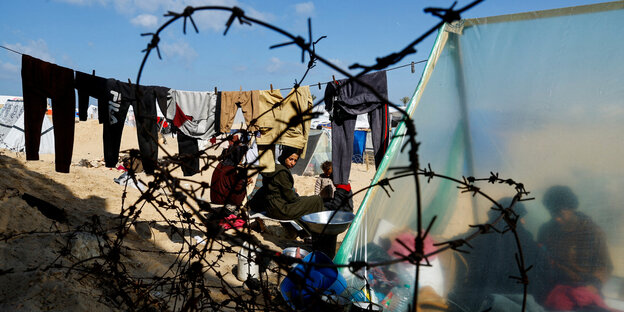Israel advances towards Rafah, in the Gaza Strip, the main refuge for the population. Egypt could help and open the border to women and children.

Palestinian refugees in the border town of Rafah, February 2024 Photo: Mohammed Salem/Reuters
The entire Middle East, as we recently read in the Taz, is in crisis due to the Gaza war. Even the Houthi and Hezbollah rockets received approval among the Arab public because they were intended to generate pressure to end the war. Now, certainly not all the Arab public will see rockets as an effective means of alleviating the suffering of the civilian population in the Gaza Strip, but of course the dramatic humanitarian situation is causing anger and despair.
But where is the pressure to actually help people in need, by opening the border in the Palestinian-Egyptian border town of Rafah, at least for women and children? This would be the most direct way to alleviate suffering, apart from, of course, the end of Israeli military action, which could be accelerated, for example, by the unconditional release of all hostages. But we wait in vain for calls to this effect, whether from the Arab world or from the demonstrations from New York to Berlin.
Yes, it is true: the statements of right-wing Israeli ministers such as Itamar Ben-Gvir or Bezalel Smotrich raise fears that once the women and children leave the Gaza Strip, Israel will take control of the coastal strip and thus expand its policy of settlements, which violates international standards. law. That would be fatal. But, first of all, there is no majority of the Israeli population in favor of such an approach, and the continuity of Benjamin Netanyahu's government beyond the war is more than questionable.
Secondly, the return of refugees could be guaranteed by international guarantees. At the very least trying to persuade Egypt to open the border to women and children who urgently need help is not only paternalistic, but also raises questions about the purpose of expressions of solidarity. Is it about alleviating the suffering of the people or defending the Palestinian territory, if necessary down to the last child?
Egypt may fear that Hamas could operate from its own territory in the future. But for too long, weapons for Islamic fascists could be smuggled into the Gaza Strip through Egypt. Egypt is a signatory to the United Nations Convention relating to the Status of Refugees, adopted in 1951, and is obliged to respect the principle of “non-refoulement.” Israel is rightly warned to respect international law.
But why not finally Egypt too? Of course, the international community should not leave Egypt alone in this task. But eventually he has to push her.